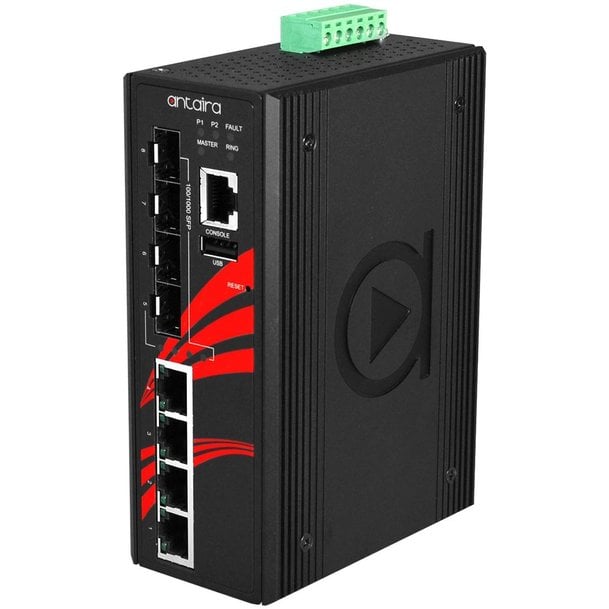www.magazine-industry-usa.com
23
'23
Written on Modified on
Using Industrial PoE Switches to Power Edge Devices
Article by Henry Martel, Field Application Engineer, Antaira Technologies.

Edge computing eliminates the latency experienced when transmitting data to a centralized cloud or a data center that can be located several time zones away. Instead, data transmission is processed at or near the local sites where it’s collected (“the edge”), removing latency issues that can cause excessive network delays and performance issues.
A growing list of industries are benefiting from edge computing’s possibilities. For instance, edge computing in industrial applications provides critical data directly to plant managers in real-time to assist in better decision-making. It can also monitor remote assets for predictive maintenance, therefore preventing costly downtime by taking remote equipment offline immediately if data transmission from an edge sensor identifies an anomaly.
Another example of industrial applications is where sensors and IoT devices connected to an edge platform in industrial factories, plants, and offices can track energy use and analyze consumption, assisting them in achieving sustainability strategies that reduce them.
The potential for enterprises to create value with edge computing is virtually endless. But there is a catch.
In order for edge devices to function, they must be powered. This continues to present serious challenges to IT staff who must find an available power source suitable for dozens or even hundreds of edge devices. In this article, we discuss how Industrial PoE switches now represent the ideal solution for IT and security teams to obtain, manage and maintain reliable power in edge locations.
Plugging In Edge Devices
When fielding questions from customers about powering edge devices, tech teams are often asked, “Can’t we just plug it in?” In locations with readily available on-site AC power, the answer is a resounding “yes.” So, if you are planning an industrial edge project, the best place to start your journey is to determine if suitable electrical outlets are within reach of your devices.
But what if there are no nearby power outlets? For instance, how can you power an IP camera in an oil field? Or a network of sensors collecting air quality data in a coal mine? Or a fleet of autonomous vehicles requiring ultra-low latency network communications?
One solution is DC batteries. Simple, yes. Reliable, no. Batteries must be constantly monitored, replaced often, and will eventually degrade over time. Another possible source of is solar power. Again, reliability is a problem. Solar may not be able to supply a mission-critical edge device’s electrical current draw requirement. Solar setups are complicated with a high rate of failure. While solar may work with a basic IP camera consuming 4 watts, if the camera is equipped with PTZ, LED lights, a heater or a cooler, solar cannot ensure a resilient full power supply 24/7/365.
Industrial PoE Switch Overview
Industrial Ethernet switches featuring Power over Ethernet or “PoE” integrate seamlessly into an edge computing environment where they supply robust, convenient, and cost-effective power to multiple edge devices, along with compliance with industrial standards and regulations. There’s no electrician required for the installation and maintenance of an outlet thanks to data and power transmission transmitted on a single cable. In tight spaces, PoE’s reduced cabling saves valuable room and enables flexible mounting of the device. Additionally, configuration changes are made simple by PoE.
Edge devices come in a variety of sizes, shapes, and power requirements. One of the many benefits of Industrial PoE switches is that have the capability to power virtually all of them. This includes power-hungry PTZ cameras, smart LED lighting, and HD monitors, as well as low-power routers, sensors, actuators, access control devices, advanced security, and more. Older devices may not be able to be powered by PoE. To avoid damaging non-PoE powered devices, a PoE Ethernet switch will send a test current to verify there is a resistor before full power is applied. If a device is not engineered for PoE transmission, a PoE splitter can be used. Moreover, if an industrial switch does feature PoE, a PoE injector is an ideal option.
PoE is standards-based, so interoperability across vendors is guaranteed. The original IEEE 802.3af PoE standard remains adequate for devices that require no more than 13 Watts of power. The IEEE 802.3at standard (PoE+) increased available electrical power up to 25.5 Watts. The latest IEEE 802.3bt PoE standard — also known as 4-Pair PoE and PoE++ — stipulates support for a full 90 watts per industrial network switch port via CAT6A cabling. To be compliant, PoE power per industrial network switch port cannot exceed 100W, but that budget is more than sufficient to support higher-powered edge devices. This flexibility is important since the number of edge devices demanding higher power is increasing. For example, new wireless access points require additional power to drive radios and provide the needed power for devices connected via the AP's USB ports.
Of course, PoE technology is only as reliable as the quality of the industrial Ethernet switches supplying it. Lower-price PoE switches can create blinders to the hidden costs related to network outages and production downtime, combined with problems stemming from the manufacturer's lack of technical support and customer service. The PoE switches you deploy to power industrial edge devices must be hardened to withstand extended temperature ranges, shock, EMC, moisture, and vibrations. They should also support connections up to 100 meters and speeds up to 1000mbps over a single twisted pair Ethernet cable.
Antaira has been a pioneer in PoE patented security technologies including the introduction of iPoE Budget Control, Safe PoE Disconnect, Power Remote Reset, and Persistent PoE. Antaira IEEE standard-compliant, high-port count industrial switches supply a maximum of 95/Watts per port (PoE++ Type 4), powerful enough for laptops, PTZ cameras, and HD screens. To learn more about Antaira PoE industrial Ethernet switches, call (714) 671-9000 or send an email to This email address is being protected from spambots. You need JavaScript enabled to view it..
www.antaira.com

